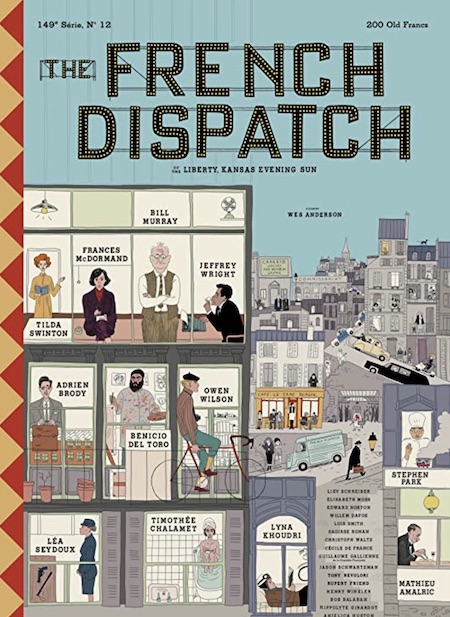

French Dispatch, The (Wes Anderson, 2021) wr. Wes Anderson, Roman Coppola, Hugo Guinness; Benicio del Toro, Adrien Brody, Tilda Swinton, Léa Seydoux, Frances McDormand (hooray), Timothée Chalamet, Lyna Khoudri, Jeffrey Wright, Mathieu Amalric, Stephen Park, Bill Murray, Owen Wilson (unfortunately), Elisabeth Moss (unfortunately), Edward Norton, Saoirse Ronan (hooray), Christoph Waltz, Willem Dafoe, Anjelica Huston, Jason Schartzman
I don't have anything to say about a Wes Anderson film that I haven't already written about one of the others, so I'll hand you over to my choice of the professional critics.
Peter Debruge:
... this is an anthology film, one that consists of “an obituary, a travel guide and three feature articles.” So while there’s no overarching narrative or overlap between segments, Anderson is quite clearly the author of all five — for there is no living filmmaker with a more recognizable visual signature, and every frame of “The French Dispatch” is unmistakably his. Thus, the unconventional project succeeds in delivering that very particular hodgepodge pleasure of reading a well-curated issue from cover to cover. (Variety)
David Rooney:
Wes Anderson pens an extravagant love letter to the adventurous editors of sophisticated literary magazines like The New Yorker, and to the writers, humorists and illustrators nurtured up through their ranks, in The French Dispatch. Bursting at the seams with hand-crafted visual delights and eccentric performances from a stacked ensemble entirely attuned to the writer-director’s signature wavelength, this is the film equivalent of a short story collection. That makes it episodic by nature and less nourishing in narrative terms than some of Anderson’s through-line features. But [it] is a beguiling curio, and one that no other filmmaker could have created. (Hollywood Reporter)
Peter Bradshaw:
The French Dispatch itself is supposed to be a special feuilleton-type supplement in a fictional Kansas newspaper, a guide to the intellectual life of France produced in the magazine’s late 60s heyday by a gallery of brilliant American expatriates in the imagined provincial French town of Ennui-Sur-Blasé – although that name is the one moment where the comedy gets a little too broad. (The Guardian)
Pat Brown:
One of the most intriguing characteristics of Wes Anderson’s films is the paradox between the extreme orderliness of their compositions and the equally outsized flexibility in structure allowed by it. His narratives always exude the density of a thick, small-print block of text, and like a writer—in particular, like one of the modernists who he clearly admires—Anderson exhibits little compunction about moving back and forth between a story’s present, past, and future within the same paragraph, so to speak. With the help of voiceover narration and precisely framed (and often labeled) illustrations, the writer-director creates elastic pockets in a plot’s timeline, rushing off on tangents flooded with information about side characters before snapping back to the story in progress. ...
The French Dispatch’s anthology format makes it difficult to draw emotional, rather than purely intellectual, connections between the individual staff of the newspaper. It doesn’t help that the film is so chockfull of recognizable talent with such tiny parts that Elisabeth Moss isn’t the only one who feels wasted, as well as a source of distraction. The sentiment needed to really sell the wistful conclusion gets buried beneath all the cameos and stylistic flair. It’s appropriate, then, that characters make frequent reference to a sign stenciled over the door in Howitzer’s private office that reminds his staffers not to cry. The good news for Howitzer—but much more ambivalent news for the rest of us—is that despite The French Dispatch’s last-act turn to the sentimental, it’s likely that the audience won’t even be tempted to do so. (Slantmagazine)
Hamish Ford:
So I watched The French Dispatch the other night. Some people who are not typically fans of Wes Anderson have liked this, but it seemed to be just as irritating, cutesy, and insubstantial as ever - and this time crossed with some '80s Greenaway vibes (without the faux-scandalous stuff). This kind of cookie-cutter pomo cinema seems so old now. And that's without even taking into account that the film being set in France is utterly ludicrous, apparently desiring some wheezy French exoticism beloved of so much US middlebrow culture since apparently forever, but with only little snippets of actual French heard like some would-be 'pepper' (this function made even more overt through being translated via novelty subtitles located not at the bottom of the screen). Despite, of course, that many of the protagonists of this story set many decades ago are supposed to be locals who strangely speak in expert US English. Episode 981234 of the world as exotic backdrop to a not very interesting 'American' story. Facebook.
as above
Garry Gillard | reviews | New: 3 April, 2021 | Now: 26 April, 2022